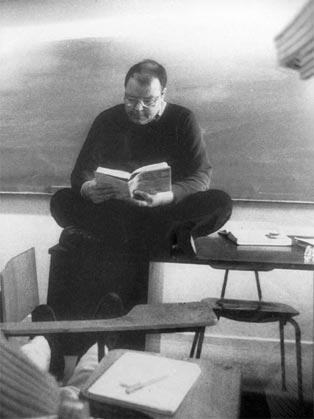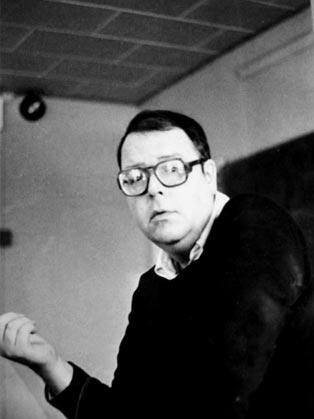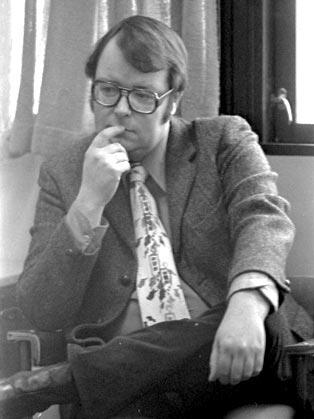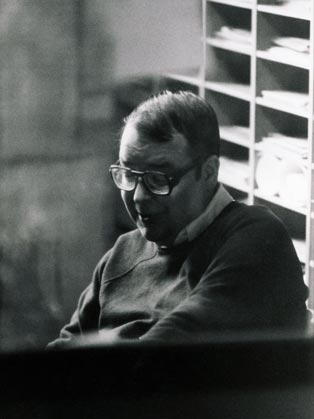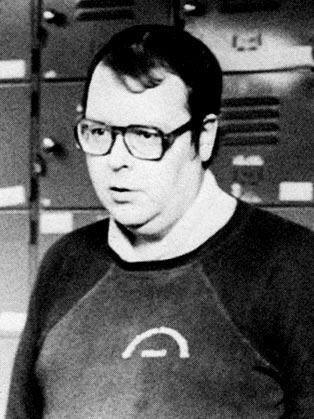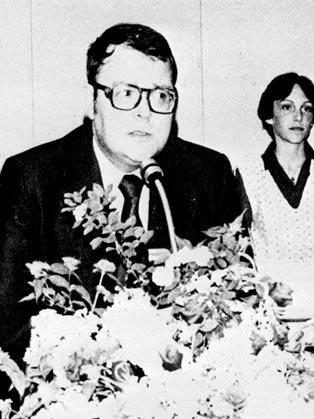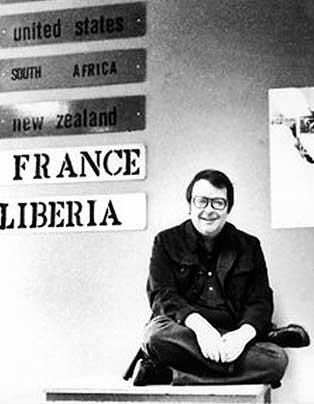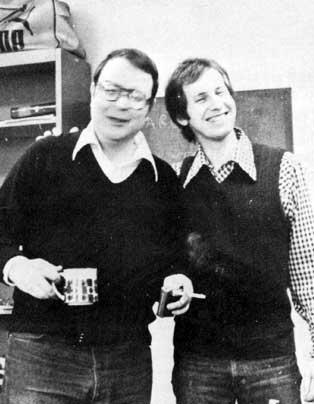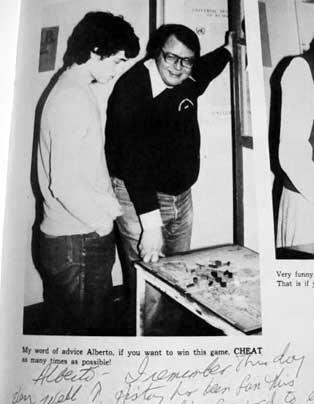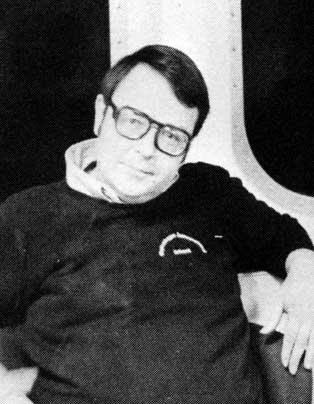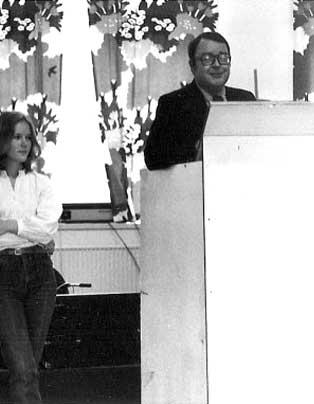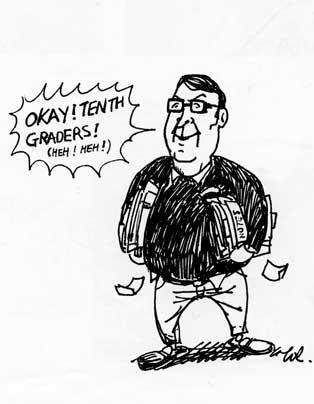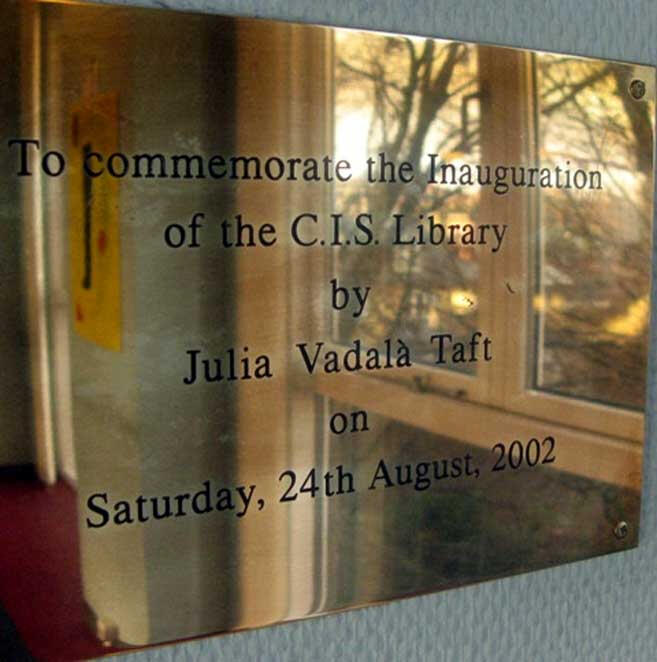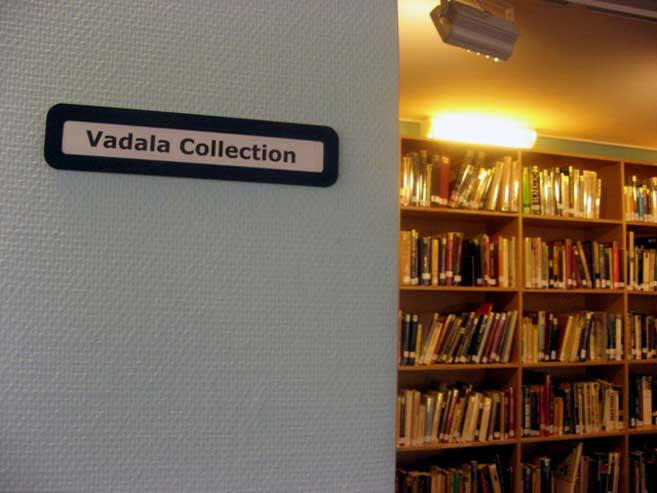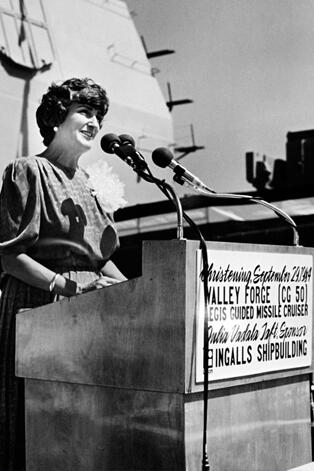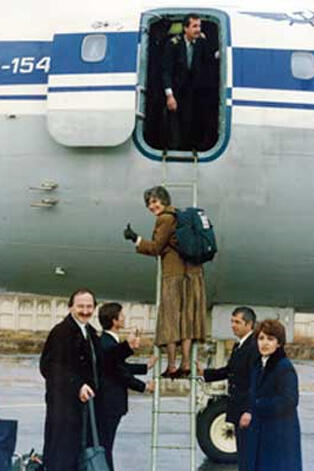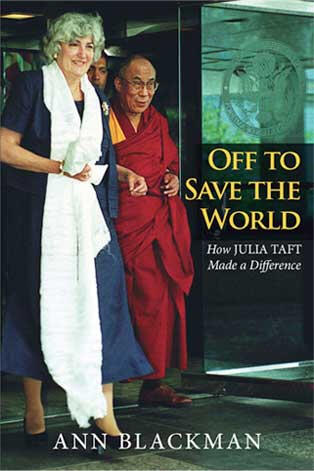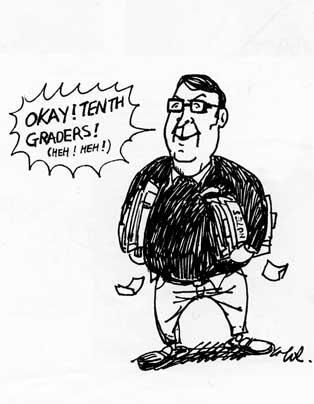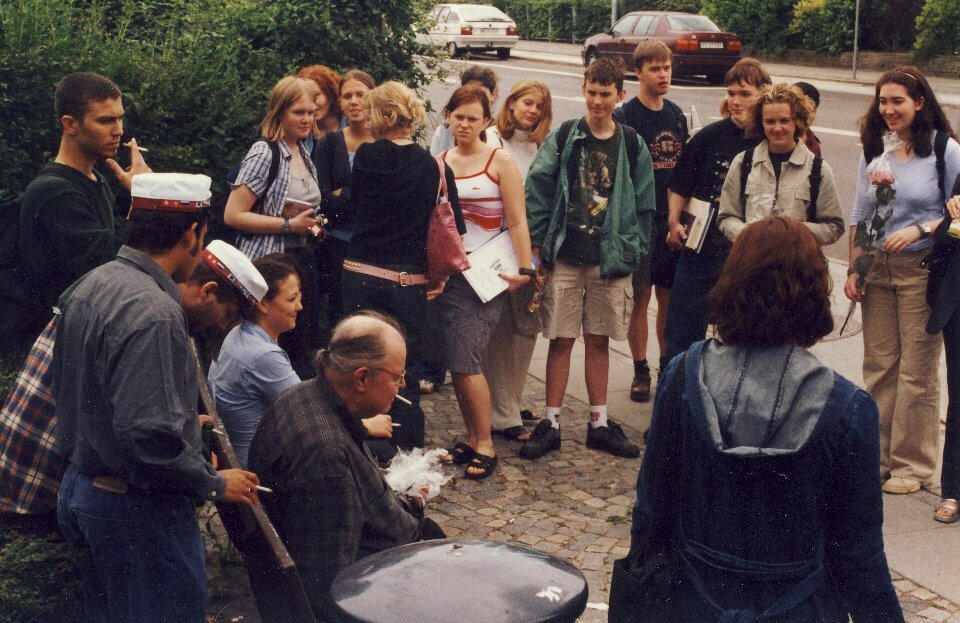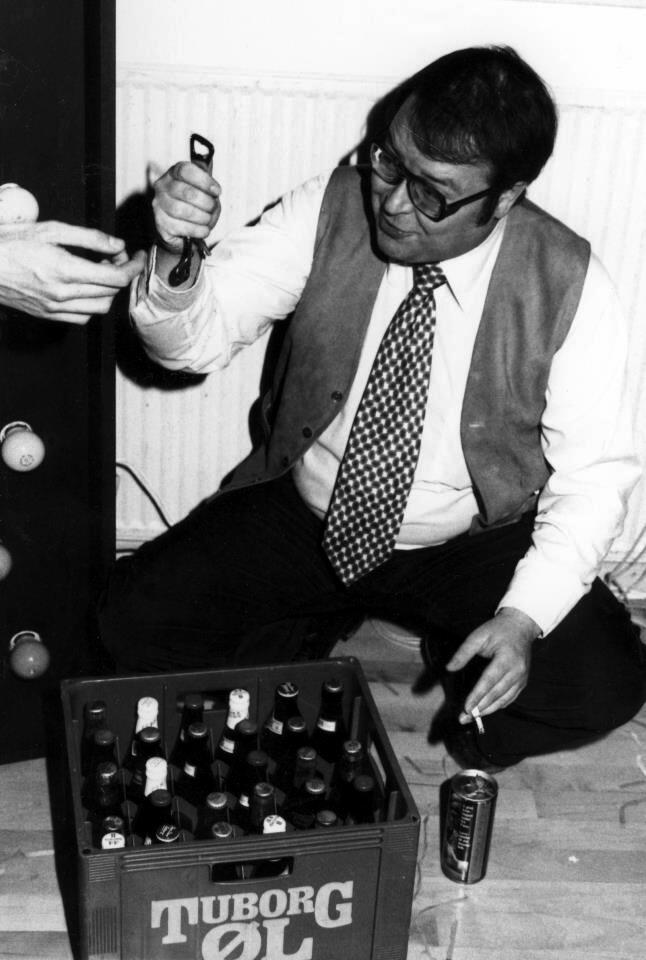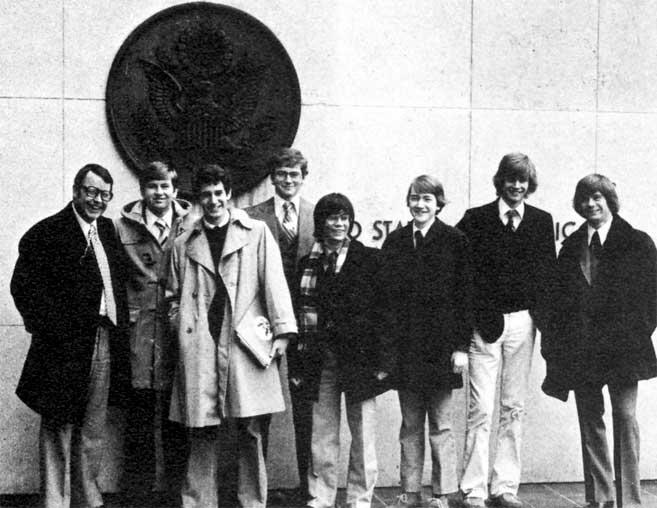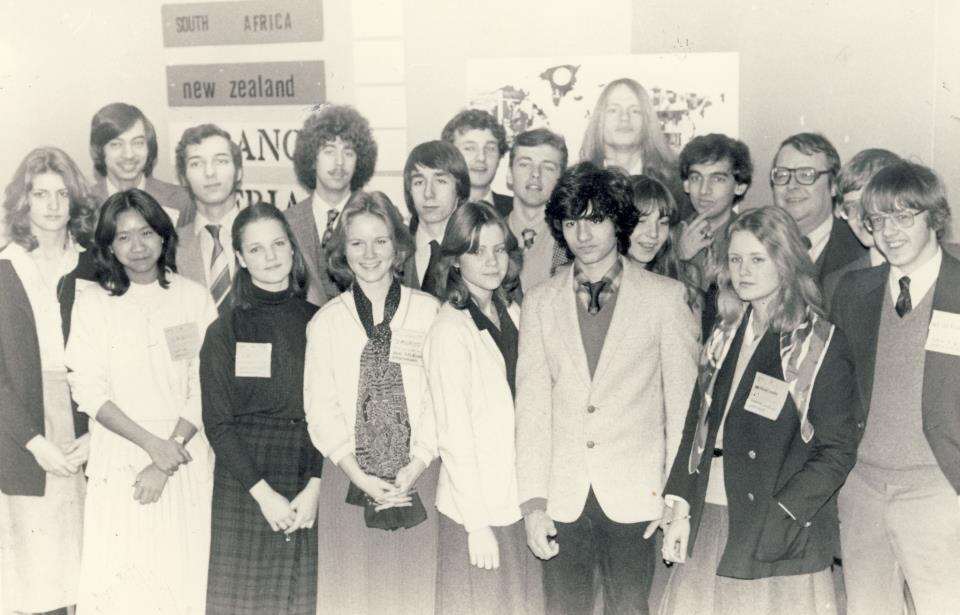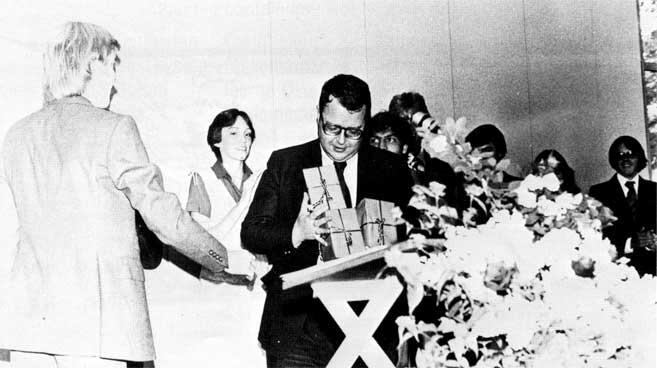| deus62 |
Anthony Vadala
| "Mr. V." | 1940 - 2000 |
"I am not a teacher, but an awakener."
- Robert Frost -
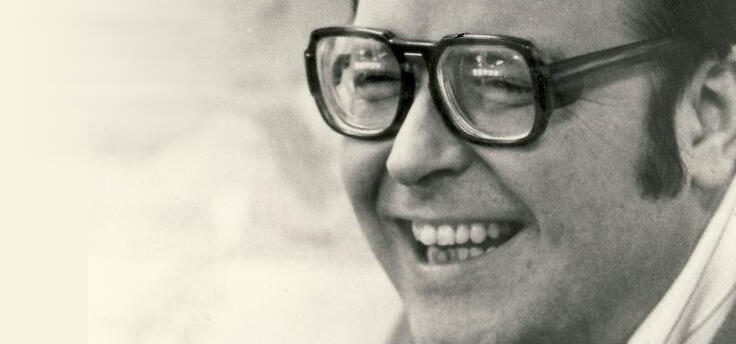
***
(July 7, 2023:) I have been online forever and two things are true: the Internet certainly does forget and, unfortunately, people also often do. More than a decade after I had this page online for a while, I could not find a single snippet about Mr. Vadala online anymore, a wonderful teacher who influenced countless students while he was teaching at the Copenhagen International School in Denmark. So, here is the page again and if you would like to add something to it, you are more than welcome to do so. Just leave a comment via my contact page and it will be included here.
***
Anthony Vadala, commonly known as “Mr. V.”, was the best teacher I ever had.
Volkher Hofmann, January 2012
He taught History and Social Studies (Politics, Social Anthropology, Western Civilization) at the Copenhagen International School in Denmark. Although I was probably pretty far from his idea of an ideal student, he taught me everything about integrity, about the (sometimes nasty) power of words, about the striving for knowledge and, most importantly, about what being a good teacher means and entails.
He was a special person in every sense of the word (I remember him opening the door to his apartment one day, brandishing a battle axe and revealing a large room lined with neatly stacked old newspapers and large ashtrays), he had a decidedly weird sense of humor and he smoked (unfiltered) Pall Malls like there was no tomorrow, but most of all he was also a fiercely dedicated teacher with an extremely firm sense of work ethics and an amazingly broad knowledge base. He also always tried to make even the most tiresome or difficult student, the disinterested or just lazy equally welcome and valuable. He invested a lot of his lifeblood into his students and it usually paid off.
His “100 Specifics” tests were simply legendary, and so was his small smoke-filled cubicle up on the second floor at the old Gammel Kongevej campus, which often became a crowded meeting point for all.
Playing board games (“Diplomacy“) with students in front of his small cubicle or convincing the headmaster that playing a good game of poker might help those of us yet unfamiliar with the English language adapt to the (often new) environment much quicker, add to the fond memories as did his willingness to participate in the odd beer guzzling tournament (to keep an eye on the assembled misfits) when appropriate or, sometimes a bit reluctantly, to participate in private festivities. Mr. Vadala was a guest at my 18th birthday formal dinner arrangement and he told me that he didn’t warm to those kinds of events easily. Then he gave a wonderful speech.
He knew I was going to be a teacher when the fact was still the furthest from my young developing mind and after I had left school, he helped me brainstorm my studies whenever I was back in Copenhagen for a visit.
I have the fondest of memories of a man who always had time for his students, was often the last person to disappear from campus, who went out of his way to aid and especially encourage each and every one of us that needed a helping hand or a quick boost, and a person whose booming voice was often heard admonishing noisy students anywhere in the school building. I can still hear his “CHILDREN!” bouncing freely off the hallway windows of his cubicle, blasting across the locker area.
For three years he tried to get me to join the Model United Nations group, a group he invested a lot of preparatory time and energy into to allow his students to get a whiff of what politics out in the wild were like, and when I continued to refuse, he resorted to adding his plea to my report cards. He was stubborn that way, he didn’t give up easily and he was the better for it.
Mr. Vadala did not get mad, he got slightly annoyed, but I do remember one single lesson in which we had apparently overstepped some invisible line. He got up and quietly left the room. The classroom fell completely silent within a second as this had been unheard of and we listened to his steps descending down to the floor below. We had no idea what to do and after two minutes of debating who should go downstairs to apologize, Mr. V. reappeared and with a very somber voice apologized to the class for not having reacted appropriately. I can’t remember what the other students in the class thought that day, but I felt totally embarrassed. Mr. Vadala taught me one of the most important lessons that day and knowing Mr. V., he knew that.
The last time I met Mr. V. was at the premiere of Mel Gibson’s “Braveheart”. Angus McFadyen, a CIS alumni, appeared in a leading role and his parents had invited a few friends of his and Mr. V. to the premiere in Copenhagen. It was a blisteringly hot day and as we stepped outside to have a cigarette during intermission, he ordered us two beers each (“Too many people at the bar. I thought I’d get two each right away.”) and we got into a giggling match while trying to balance two plastic beer cups and a cigarette each. After about 15 minutes of small talk he suddenly said: “Volkher, I’m so glad that you managed to find your place in the world. I knew you would.” When I replied that he had been the single most important reason for me to become a teacher, he smiled warmly and just before we re-entered the movie theater, he gave me a quick hug – something completely unheard of – and silently disappeared into the crowd. You know, cheap Hollywood films and tear-jerking novels aside, today I am glad that I was able to tell him how important he had been in my small world.
Mr. Vadala was a great man without whom I would definitely not be where I am today. He was someone who left his mark on countless generations and, to me, he was the epitome of a role model. He was – and still is today – someone to aspire to. At the school I worked at until I myself retired, most students knew who Mr. V. was, simply because I always managed to mention him and what a great man he was. His legacy lived and lives on.
***
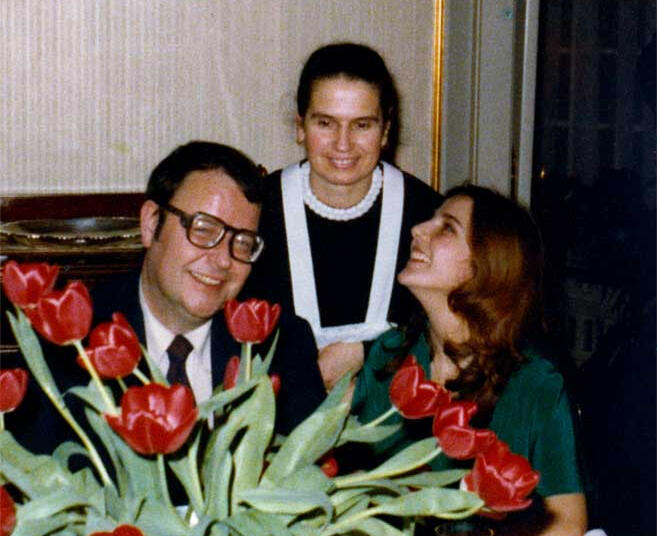
This is one of my favorite photos, taken at the Mexican ambassador’s residence. On the right, Beatriz del Villar.
***
CIS Memorial Service
Bheka Pierce , November 2000
Note: On Monday evening, 13 November 2000, fellow teacher Mr. Bheka Pierce sent the following mail to all CIS alumni. I have kept it around all these years. I’m grateful to Mr. Pierce for allowing me to publish it here in its entirety.
***
– wet leaves falling onto wet ground
Hello All You Antiquated Alumni and Alumnae,
I only wish I were writing under happier circumstances. Given the incredibly intricate grapevine of the CIS vineyard, you may already know that Mr. V. stepped into the history he loved last Wednesday, 9 November, suffering a heart attack on the sidewalk near the front of his apartment. His neighbors of many years phoned the U.S. Embassy, who phoned the school on Thursday.
His sister Julia Vadala Taft and her husband flew in from Washington, and we held an informal memorial service for Mr. V. at the school today.His sister, who is very much like him, very gentle-hearted and student-oriented, told us about growing up with him, saying that he was born in Panama in 1940, but that their military family had moved around a lot, giving him early on an appreciation for what being an international-nomad kid was all about. She joked with us that as his kid sister, she was his first student. In Germany as kids, she said, he’d see a car license plate, read the numbers 1-4-9-3, and say, “Now, Julia, what happened in 1493?” (Somehow I hear him saying that already in his basso voice at age seven or so.) She talked of his dedication to students and how often he spoke with her about the pleasures of teaching his history, especially at CIS. She spoke bravely and well, but it was difficult for her, of course, particularly while reading an old letter from a former student, Mike Rhodes, who’d written to thank Mr. V. for helping him select his life profession–to be a teacher of history.
Christopher Pedersen and Neel Kaul, two present day students, spoke, recalling Mr. V.’s dedication as a teacher (his last IB results were a phenomenal array of 7′s and 6′s way, way above the world average), and his help and guidance with THIMUN.
I said a few words about, among other things, Mr. V. back in 1980, when he and my son Johs, then four, began their friendship while having a serious discussion about the flags that lived on the table outside Mr. V.’s Gammelkongevej office; about Mr. V.’s infamous “100 Specifics” quizzes, and about that truly magical voice of his, which–when he was on a roll–seemed to let history flow easily into student heads not only on the sheer musicality of his voice, but also because of that way he had of making students feel he was letting them in on secrets far too good to miss.
My wife Britta, our school’s IB coordinator and earth-mother, spoke warmly of her ten-year shared experience of THIMUN with Mr. V., explaining how he had helped her get used to everything that goes on at The Hague, showing her the ropes, so that now she felt well tutored for taking over this year. She didn’t make it too far before she was hauling out the tissues, but we were all with her, and judging from the hug Mr. V.’s sister gave her afterwards her words and tears were warmly received.
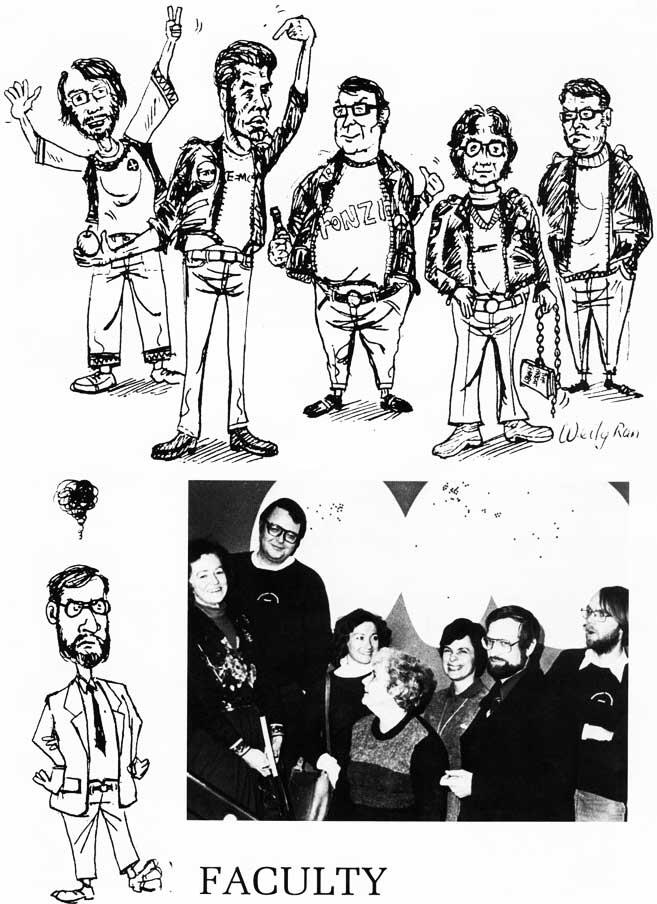
Mr. Keson, our long-time headmaster and senior math teacher, with thirty years at CIS, the only one predating Mr. V., also spoke, going way back into the ’70s, telling how Mr. V. had come to him one day, saying, “You know, Jim, some of these kids don’t have much English, so I’m going to teach them how to play poker. Give them a chance to be together, try a little English, where not much English is required.” For me, that was Mr. V. to a tee. A little off the beaten track, for sure, but as always with the kids in mind.
It was a warm service, more than a few light moments recalled, Napolean’s horse getting a mention, recollections of the V. booming “Children!”, a photograph of Mr. V. doing his Buddha impersonation while reading on his front table, and much affection for the man- -as Mr. Keson pointed out–whose gentle personality, unshakable human regard for students, and commitment to the values of education did so much to help form and establish the early personality of our old school.
Chris Bowman, the present director, explained that the school’s official website has set up a place for anyone to include a reflection or remembrance of Mr. V. Anything that comes to mind, long or short, would be appreciated, not least because Mr. V.’s sister will be checking in on that website to hear from anyone about her brother. Also, if possible, could you let other people in your former history classes know about Mr. V. and the website?
In the meantime and in the name of Alexander’s horse, I hope you are all doing well out there wherever you are on the globe,Bheka PierceP.S. And those horses were, just in case they have slipped your memory: Copenhagen and Bucephalus.
***
The Vadala Collection
Volkher Hofmann, July 2023
Note: I have no idea, if this can be found anymore in an age of ever-present online resources and especially after the school relocated, but I suspect it cannot, but it once existed.
Anthony Vadala’s legacy lives on at the Copenhagen International School where you can find his extensive book collection, integrated into the school library as the “Vadala Collection”.
***
***
Julia Vadala Taft
Volkher Hofmann, July 2023
Many of us knew that Mr. Vadala had a sister, but I never had the chance to meet Mrs. Julia Vadala Taft, who was married to the great-grandson of U.S. President William Howard Taft, William Howard Taft IV. When I published an earlier version of my “Mr. V.” article on another website, I sent her the link to it and a brief flurry of e-mail activity followed. I had the feeling that she was as special a person as her brother had been, so I thought it is only appropriate to include her here.
Mrs. Julia Vadala Taft, born two years after her brother, in 1942, passed away in 2008. You can find lots of information online about her, especially in a Wikipedia entry, “Julia V. Taft“, and the New York Times obituary, “Julia Vadala Taft, Official Who Led Relief Efforts, Is Dead at 65“.She lived what her brother taught at school.
Early on she became aide to United States Secretary of Health and Human Services, Elliot Richardson. In 1975, President Ford appointed her as Director of the Interagency Task Force on Indochina Refugees and she oversaw the resettlement of more than 130,000 evacuees from Cambodia, Laos, and Vietnam after the fall of Saigon. For nearly three decades, she designed and developed refugee programs for the US Department of State, the US Department of Health and Human Services, the US Agency for International Development, and the United Nations. From 1986 to 1989, she was the Director of the Office of Foreign Disaster Assistance (USAID). She coordinated the efforts of the State Department, the Pentagon, other government agencies, and non-governmental agencies like CARE and Save the Children in responding to requests for disaster aide from foreign governments. From 1994 to 1997, Mrs. Taft was head of InterAction, a coalition of non-governmental organizations dedicated to international aide and in 1997, President Clinton nominated her to be Assistant Secretary of State for Population, Refugees, and Migration, and she subsequently held this office from November 10, 1997 to January 19, 2001. From 2001 to 2004, she was director of the United Nations Development Programme’s Bureau for Crisis Prevention and Recovery and she oversaw the United Nations response to displaced persons related to the War in Afghanistan.
***
Memories
More than a decade ago, for a short while, many students posted thoughts about and memories of Mr. Anthony Vadala online, only a few of which survived because I did not or could not save them. I have not had the chance to ask for permission to post the thoughts you find below, especially because many of the people have moved on, disappeared from the Internet or are otherwise unavailable, so I'm going to take the risk, post a selection here, use first names only and otherwise hope that nobody is going to sue me.
***
From the former Rygaards International School forum, which does not exist anymore.
Note: "Rygaards was and is the second International School that resides in Copenhagen, Denmark. Many students transferred to CIS after 10th grade.
*
Judith: "News for all of you who also went to CIS: Mr. V. died last week, November 9th, from a heart attack. I was very sorry to hear the news. I have very fond memories of him giggling away in his smoke-filled office, talking about history or current affairs."
*
Paul: "We are talking about Mr Vadala here? The big guy who always wore the same blue sweat shirt and taught history to us... I liked him and am saddened to hear of his death. Though he did smoke rather alot."
*
Alexia: "Yeah, who could forget Mr V, the buddha-like/Jabba the hut-like figure from CIS ... I must admit (although I'm saddened to hear of his death) that I thought it might have happened before now - he wasn't exactly the world's healthiest person! He was a great teacher, just in the sense that he had SUCH enthusiasm for his subject and was totally approachable as a person, not just as a "teacher"/authority type. By the way, I sucked at History in CIS - shame he never knew that I got a PhD in it!!!"
*
Eduardo: "It's a sad and terrible loss. Mr Vadala will be fondly remembered by many, many students. In 13th grade, his 7:30am history class was a bitch to get to on time, and yet was packed by students who were eager to listen to him.Mr Vadala contributed to CIS in more ways than just history. He spent countless hours with students in his "office", offering advice and counselling many on non-history issues. He was also the organizer of the Model United Nations (MUN) program at CIS, and last but not least the chief authority and judge of our Diplomacy games, which more often than not got out of hand.The little appreciation I have for the subject today was mostly due to him.He will be missed."
*
Frank: "Mr. V was revered in the same way as Mr. Ebeling is at Ryggards. He was really a great teacher. I was also concerned about his health. I recall some students were doing blood pressure measurements one day in 1984 or 85, and he came in around 160-170 for systolic pressure.I remember chatting with him once in his smokey office about college telling him that I was going to do Chemical Engineering. He told me that he had started out in that field and he switched into this smile, bouncy-nod-the-head routine. Incidentally I went to Columbia, which has a great history program, including Paxton who authored that green book we used in 13th grade. I wanted to take Paxton's class, but didn't have time to do the considerable reading so switched to listener status. Alas, I did stay the course in engineering school.Incidentally, I noticed (see CIS website) that they had put a plaque on a bench outside the "new" school when he retired (old Hellerup Skole near Cafe Apoteket for you old timers). I suspect that the health-Nazis eventually stopped him from smoking indoors! I can still feel the acrid smoke in the back of my throat from his non-filter Pall Malls ..."
***
James "Jim" Keson, former headmaster:
"Mr Vadala started an ongoing game of Diplomacy, a board game which involved a pre-WWI map of Europe. Students made alliances and conspiracies until one country dominated or the whole continent broke down into bickering and ill will. When MUN was getting off the ground down in the Hague, and we were among the first schools to join, it could build on student experiences with “Diplomacy”.Mr. V. also decided that something needed to be done for the ESL students, who needed to socialize but lacked the linguistic skills of the then mostly American and the British student body, so he took to running poker games in the student lounge. Playing for matches, the ESL kids could hang out with just a few useful phrases like 'Four aces beat a straight,' and 'Oops, shouldn't we be in maths class?' When it was discovered that a few of the more ambitious students had been conducting poker sessions after school, and collecting quite a bit of pocket money from their more innocent classmates, the poker classes were shut down."
***
From "CIS Footprints: 50 Years Special Edition", August 13, 2013
Question: What are your best memories?
Angus: I guess, model UN in The Hague was always exciting [...]
Question: What are your best memories?
Mandana: I think my best memories are from MUN. The energy, the hustle and the bustle and all the discussions and debates we had! The trips to The Hague, the competitive edge - we were well prepared and took on anybody who tried tro challenge us.
.
Comments left by former "CISers" via this website:
Andrew E.: "I was never one for looking back but now I am semi-retired and 60; I guess I have the time and inclination to think about the key influences in my life. Mr. V. taught me for three years as well as leading two trips to the Hague for MUN. Even back then, I was more science minded, but Mr V drove in me a wonderful broadening of perspective across history, politics and the social sciences. A real inspiration and I still remember the name of Alexander's Horse!" [January 31, 2024]
*
Sue Tibbs: "I am so saddened to learn of Mr V’s passing. Tony Vadala was one of the kindest, realist, intelligent teachers I ever had in my life, I’ll always remember a history test I got 2 answers right on and got them round the wrong way! Still remember the answers, Alexander the Great's horse, Bucephalus, and Caligula's horse, Incitatus. [...] Mr V. made learning fun although being the class clown I was rubbish at tests, I’ve improved somewhat! CIS holds a special place in my heart and Mr V will always be that teacher you never ever forget." [February 12, 2025]
© deus62, 2012 - 2025.

